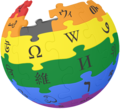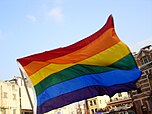Portal:LGBTQ
| Main page | WikiProjects & Things you can do |

|
The LGBTQ+ Portal |

|

|

|
Introduction LGBTQ (also commonly seen as LGBT, LGBT+, LGBTQ+, and LGBTQIA+) is an initialism for lesbian, gay, bisexual, transgender and queer or questioning. It is an umbrella term, broadly referring to all sexualities, romantic orientations, and gender identities which are not heterosexual, heteroromantic, or cisgender. In the 1990s, gay, lesbian, and bisexual activists adopted the term LGB, supplanting narrower terms such as "gay or lesbian". Terminology eventually shifted to LGBT, as transgender people became more accepted within the movement. Around that time, some activists began to reclaim the term queer, seeing it as a more radical and inclusive umbrella term, though others reject it, due to its history as a pejorative. In recognition of this, the 2010s saw the adoption of LGBTQ, and other more inclusive variants. Some versions of the term, such as LGBT+ and LGBTQ+ add a plus sign, to represent additional identities not captured within the acronym. Many further variants exist which add additional identities, such as LGBTQIA+ (for intersex, asexual, aromantic, and agender) and 2SLGBTQ+ (for two-spirit), LGBTQQ (for queer and questioning), or which order the letters differently, as in GLBT and GLBTQ. The collective of all LGBTQ people is often called the LGBTQ community. These labels are not universally agreed upon by everyone that they are intended to include. For example, some intersex people prefer to be included in this grouping, while others do not. Various alternative umbrella terms exist across various cultures, including queer; same gender loving (SGL); and Gender, Sexual and Romantic Minorities (GSRM). (Full article...) Selected article -The Well of Loneliness is a lesbian novel by British author Radclyffe Hall that was first published in 1928 by Jonathan Cape. It follows the life of Stephen Gordon, an Englishwoman from an upper-class family whose "sexual inversion" (homosexuality) is apparent from an early age. She finds love with Mary Llewellyn, whom she meets while serving as an ambulance driver during the First World War, but their happiness together is marred by social isolation and rejection, which Hall depicts as the typical sufferings of "inverts", with predictably debilitating effects. The novel portrays "inversion" as a natural, God-given state and makes an explicit plea: "Give us also the right to our existence". Shortly after the book's publication, it became the target of a campaign by James Douglas, editor of the Sunday Express. Douglas wrote that "I would rather give a healthy boy or a healthy girl a phial of prussic acid than this novel." A British court judged it obscene because it defended "unnatural practices between women"; not until 1949, twenty years later, was it again published in England. In the United States, the book survived legal challenges in New York state and in Customs Court. (Full article...) Selected biography -Alicia Christian "Jodie" Foster (born November 19, 1962) is an American actress and filmmaker. She has received numerous accolades, including two Academy Awards, three BAFTA Awards, three Golden Globe Awards and a Primetime Emmy Award. She was also honored with the Golden Globe Cecil B. DeMille Award in 2013 and the Honorary Palme d'Or in 2021. Foster began her professional career as a child model and later gained recognition as a teen idol through various Disney films, including Napoleon and Samantha (1972), Freaky Friday (1976), and Candleshoe (1977). She appeared in Martin Scorsese's comedy-drama Alice Doesn't Live Here Anymore (1974) and the thriller Taxi Driver (1976). For her role as a teenage prostitute in Taxi Driver, she received a nomination for the Academy Award for Best Supporting Actress. Other early films include Tom Sawyer (1973), Bugsy Malone (1976), The Little Girl Who Lives Down the Lane (1976), Carny (1980), and Foxes (1980). (Full article...) Selected quote -
Current events
Selected image - Boy with a Basket of Fruit (1593–94) is a painting by Caravaggio. The model was his friend and lover, the Sicilian painter Mario Minniti, about 16 years old at the time. At one level the painting is designed to demonstrate the artist's ability to depict everything realistically, from the boy's skin to the folds of the robe to the weave of the basket. A closer look however reveals that, as in another painting by him from that time (Basket of Fruit), the peaches have spots and the leaves are diseased, perhaps a comment by the artist on the closeness of beauty and decay in life.
Did you know… -
This month's birthdays
Selected listsRelated portalsFeatured contentThe following articles and lists have been identified as some of the best produced by the Wikipedia community:
TopicsCategoriesAssociated WikimediaThe following Wikimedia Foundation sister projects provide more on this subject:
Discover Wikipedia using portals |

























